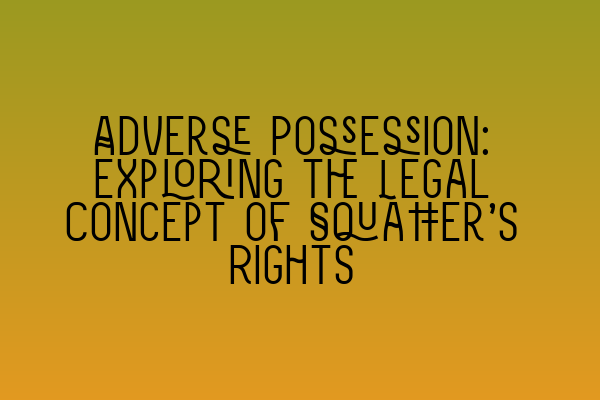Adverse Possession: Exploring the Legal Concept of Squatter’s Rights
At SQE Property Law & Land Law, we understand the complexities and nuances of property law. One area that often raises questions and sparks interest is the concept of adverse possession, also known as squatter’s rights. In this blog post, we will delve into the legal intricacies of adverse possession, its requirements, limits, and implications.
Before we proceed, if you are interested in learning more about landmark cases and influential judicial decisions in contract law, be sure to check out our SQE Contract Law: Analyzing Landmark Cases and Influential Judicial Decisions article. It provides valuable insights into the evolution and application of contract law.
What is Adverse Possession?
Adverse possession is a legal doctrine that allows an individual or entity to acquire ownership of a property by occupying it for a certain period of time, typically without the permission of the owner. The basic premise is that if someone possesses land openly, exclusively, continuously, and without the owner’s consent for a specified period, their possession can eventually ripen into full legal ownership.
The concept of adverse possession serves as a way to balance the rights of long-term occupiers with the need for legal certainty and efficient land use. It prevents dormant landowners from neglecting their properties while rewarding those who actively utilize and improve the land.
Requirements for Adverse Possession
To establish a claim for adverse possession, certain requirements must be met:
- Actual Possession: The squatter must physically possess the land, treating it as their own, and using it exclusively for their benefit.
- Open and Notorious: The possession must be visible and obvious to anyone who inspects the property, without attempting to hide their occupation.
- Continuous Possession: The squatter must occupy the land continuously for the required statutory period, typically ranging from 10 to 20 years, depending on the jurisdiction.
- Hostile Possession: The occupation must be without the owner’s permission or consent. However, this does not necessarily imply ill intent or malice.
- Exclusive Possession: The squatter must have exclusive control over the land, excluding the rights of the true owner or other third parties.
It is important to note that each jurisdiction may have variations in the specific requirements for adverse possession. Therefore, it is crucial to consult with a legal professional who specializes in property law to understand the rules applicable in your jurisdiction.
Implications of Adverse Possession
The consequences of a successful claim for adverse possession can be significant. The squatter gains legal ownership of the property, effectively displacing the original owner. This can have financial, emotional, and practical implications for all parties involved.
However, the law also considers the interests of the true owner. In some cases, the original owner may have legal remedies available to challenge the adverse possession claim, such as serving notice to the squatter or initiating legal proceedings to regain possession.
If you are interested in more resources about contract law, be sure to explore our articles on:
Understanding Contractual Capacity: Rights and Limitations
Interactive SQE Mock Tests for Contract Law: Test Your Knowledge
Join Our SQE Contract Law Webinars: Expert Insights and Guidance
SQE Prep: Mastering the Essentials of Contract Law
Seek Legal Advice
Given the complex nature of adverse possession, it is essential to seek legal advice if you have concerns or questions. Our team at SQE Property Law & Land Law is here to provide guidance and support, ensuring that you understand your rights and responsibilities.
Contact us today to schedule a consultation and let us assist you with your property law matters.
